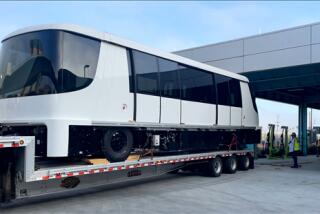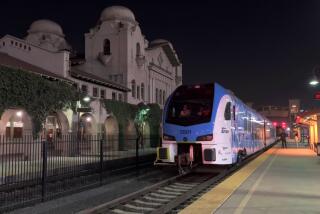Morrison Knudsen Bets Its Future on Rail : Transportation: Boise- based company’s recent contracts raise hopes for a rebirth of the industry.
- Share via
BOISE, Idaho — In the 19th-Century factory where George Pullman built the world’s first sleeping car, the only domestic manufacturer of new rail cars is trying to reclaim U.S. dominance in the industry.
Morrison Knudsen Corp., recognized for construction projects such as Hoover Dam and the Trans-Alaska Pipeline, is following Chairman Bill Agee’s vision of trains recovering the place in the transportation industry that they lost to planes and trucks.
Some industry watchers share that vision. “There is a substantial rebirth in electric trains,” said Richard Kunz, editor of the New Electric Railway Journal, a Chicago publication. “MK is poised to play an important part.”
Boise-based Morrison Knudsen, which has taken over the former Pullman Standard plant in Chicago, won the largest transit car contract in its history last year. The $380-million deal with Metra, the northeastern Illinois commuter rail system, is for 173 new and 140 rebuilt cars.
The Chicago operation will also handle a $100-million, 50-car order for the first single-level sleepers ordered by Amtrak since its creation in 1971. The one-piece stainless steel cars are shipped to Morrison Knudsen’s Hornell, N.Y., plant for final construction.
The contracts raise hopes for success in a market dominated by foreign companies since the mid-1980s. The Amtrak order was a blow to Bombardier Co. of Canada, Morrison Knudsen’s only North American competitor. Bombardier had bought the rights to the last U.S. passenger car designs from Pullman Standard Co. and Budd Co. when they went out of business.
Also in the works is an 88-car, $155-million agreement with the California Department of Transportation; up to 80 cars for the Bay Area Rapid Transit system in San Francisco, and a $101-million, 48-car contract for Metro-North in Chicago.
Overall, Morrison Knudsen has a $1-billion backlog of rail car work, with up to another $1 billion in options for additional cars. Rail orders account for about a quarter of the company’s total backlog, said Tom Smith, president of the company’s rail systems group.
Morrison Knudsen has also evolved into the world’s largest remanufacturer of locomotives. And it is developing switch locomotives that run on natural gas to reduce urban pollution and massive diesel engines to pull miles of freight cars cross-country.
Congested highways and air space are behind the rail renaissance. Former President Bush signed the Intermodal Surface Transportation Act into law in 1991, authorizing $151 billion for transit improvements.
The Texas High Speed Rail Authority awarded a Morrison Knudsen-led consortium a 50-year franchise to finance, build and partially own a $6-billion high-speed rail system linking five Texas cities.
But Morrison Knudsen has also found that the rail business has its pitfalls. The company lost out on a $1.1-billion commuter line project in Honolulu after city leaders decided against proceeding. And the company was criticized in Forbes magazine last year for sinking its resources into projects not expected to turn a profit for years, if at all.
Corporate officials contend that the extended terms of the contracts, often combining public and private financing, are more palatable for taxpayers and stockholders.
Kunz said Morrison Knudsen is fulfilling a need for a risk taker in the market to create rail corridors that will ease the burden on deteriorating highways. And he said it appears to be succeeding in doing something other domestic companies have not. “I think it is careful growth of a business which has made very few missteps. Even if it’s complex, MK seems to be able to read the instructions.”
More to Read
Sign up for Essential California
The most important California stories and recommendations in your inbox every morning.
You may occasionally receive promotional content from the Los Angeles Times.













